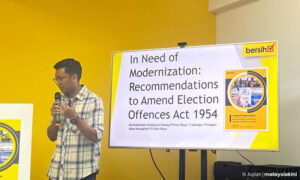By LoyarBocor | LoyarBurok
It would appear that even lawyers have to spread propaganda to succeed in court. This pamphlet may have been banned by the Home Ministry if it was a book floating around our bookstores.

Advocacy alone does not win cases. Even brilliant advocacy cannot overcome inadequate preparation.
Every revolution needs an evolution. Every court win is a revolution. To achieve the win, we need to evolve with the case and evolve the case. 50% of successful court advocacy is achieved in the office. The other 50% is before the judge in court. (Of course, much depends on the judge but that’s for another day.)
Here are some views and expectations when you assist lead counsel on a file as 2nd chair/junior counsel. These are merely general guidelines which should be tailored accordingly to the whims and fancies (and eccentricities in some cases) of the respective lead counsel.
There are generally 3 stages from inception to the conclusion of a revolution.
Stage I: Get-up
1. The facts of the case make up the case, and they are more important than the law. Read the file. Know the file inside and out, cover to cover. Understand the case of the other side and our case. Every document must be traversed, and you must be able to explain the same and know where to find it. The facts must be at your fingertips. In other words, you should be prepared to argue the case yourself without lead counsel.
2. Know the law, both procedural and substantive, applicable to the facts of the case including the law that is against us. If you do not, make sure you do thorough research (even if it means staying overnight in the office library, and camping out there with a sleeping bag). If you are encountering a new area of law, ensure that your research covers every possible angle of that area as if you are attempting to gather materials to write your legal thesis to be published as a book to make money.
3. In doing your research, it is important to consider the arguments and cases that can be used to defeat our case, and to attempt to distinguish them. Do not disregard adverse cases; bring them to counsel’s attention. Go back to counsel and discuss your findings, and clear your doubts with counsel beforehand.
4. Make sure the client knows what we are doing and what to expect, and the date of the next hearing/mention. Official letters or emails must be written to the client to this effect.
5. Fees and disbursements as agreed according to the fee structure must be paid. Subject to consultation with and approval by counsel, inform the client if we are not being paid per schedule, we will not do further work or attend court.
6. Court directions pertaining to the case must be adhered to. You are to ensure that a timetable is drawn up (after discussion with counsel) and followed – this is important and helpful. Remind counsel of deadlines. Discuss any problems you may have with the work early, e.g. adhering to deadlines (rather than leaving it too late to solve). Do the 1st drafts of everything (including pleadings and submission) unless instructed otherwise or where a secretary may do the same (subject to consultation with and approval by counsel). If directions have been given for written submission to be filed before a hearing date, conduct a file search to get all the relevant enclosure numbers which will be referred to in the submission.
7. Get-up required before the hearing includes taking instructions from client (if it means going to and staying in prison to see client – do it) and doing the draft pleadings and submission. This must be part of the timetable to be followed.
8. File management is key to Stage I. The file must be properly managed where documents are in the ‘right’ places as arbitrarily/illogically determined by counsel. Your views on this, no matter how well-meaning or well-thought out, are irrelevant. If you feel strongly about something, speak out and discuss or debate this with counsel to convince him/her of your view. Do not shut up and only take instructions like a robot.
9. There should not be loose documents all over, in or under the file. All documents must be placed in the respective folders and tied together with the supplied pink string. Rubber-bands should not be used to hold files together. The file should, as far as possible, not be separated into parts which may cause certain parts to easily disappear or go missing. Cause papers, documents, exhibits and evidence must properly be filed and kept accessible but easy to find. Documents in folders should be appropriately described or marked in summary form at the top of the folders. Documents taken out must be returned to their ‘right’ places in the file.
10. Make sure all relevant statutes, bundles of authorities, cause papers, counsel notebooks and stationery [including post-its, highlighters (only use yellow)] are packed into counsel’s bag to be brought to court. You should prepare a special counsel folder with all relevant papers and authorities which counsel requires for trial. Plan with counsel how the bags will be carried and who will carry them, and when and where you will meet in court.
11. Call the court a few days in advance to find out if the judge is proceeding with the case and whether there are likely to be any delays or adjournments. Call up opposing counsel (unless you are a pupil in which case, remind counsel to do so) and find out if he/she is seeking an adjournment, or wishes to file further affidavits, or if there is a change in circumstances, etc.
Note that Stage I is extremely important. Failure to evolve at Stage I will quite definitely cause problems, sometimes fatal, at subsequent stages.
Stage II: Trial/hearing in court
12. Make sure that you arrive early in court and note the number of your case on the court list. Look at other cases also to evaluate what the judge has for that day, and which case would likely irritate him/her or take up most of the day. Inform counsel of your finding.
13. Record the names of counsel and where necessary, inform the court of our names. Take down the names of the other side as well, and give it to counsel in the event counsel is to introduce the parties. Be pro-active and look for the other side’s lawyers as opposed to waiting for them to introduce themselves. Be cordial, courteous and nice to them even if you do not like them.
14. Note the full name of the judge (including any honorifics and titles – yes, get real, we live in that type of country) and any other relevant parties.
15. Ask court for permission to check the enclosure numbers and then write the numbers on our court documents in red pen at the top far right corner of the document. If possible, do a list of the enclosure numbers side-by-side a brief description of the court document. Check with the interpreter/court staff and ensure that any important documents filed in court (or delivered to court) for the hearing are in the file especially if filed a few days before. For this purpose, please make sure that you have with you the filing receipt or letter acknowledging receipt of the documents.
16. Make sure everything is properly recorded in your counsel notebook. That means recording the names of all parties/lawyers, start and end times, submission/ arguments made, judge’s comments, directions/orders made and other details to give a complete picture of what transpired in court on the particular day. Of utmost importance is the precise order/judgment pronounced by the court, and grounds, if any. You are in charge of the notebook. Do not lose it as it records the evolution of the case in court as it marches towards an inevitable revolution. Hang on to the book with your life. You must treat the notebook better than your diary, or your cigarette, because you may leave the firm (on bad terms) and someone else will need to know what happened when he/she takes over the file from you. For court-assigned cases, every detail needs to be recorded so that the appropriate claims may be made to court subsequently.
17. The relevant documents to be handed over the judge or the other side must be done but only after consulting counsel. Do not give anything to the judge or the other side unless counsel says it is alright to do so (or unless it is a love note which is your personal matter save you CANNOT under any circumstances give a love note to a judge). Note that documents should never be handed to the judge directly but rather should be handed to the interpreter/court staff who will then pass it to the judge.
18. As proceedings commence and continue, make sure that the proceedings are neatly recorded in the book. Improve your handwriting if need be, take classes if you require them. Questions of witnesses should be in black/blue and answers in red. Of great importance are the orders/directions/judgment of the court. What is recorded in the notebook is very important in the event of a dispute between the parties, i.e. applications have been made before to expunge or include evidence recorded/not recorded by the judge on the basis of what counsel had recorded in his/her notes, and particularly when the file is audited say, in 6 months’ time by a different counsel who is not you.
Stage III: Get-down
19. After the case, you may have a drink and a chat. But do not dilly-dally. Immediately return to the office, have a de-brief and then discussion with counsel on what needs to be done as follow-up. For example, where a trial with witnesses has started, type out the notes of evidence immediately; where exhibits have been introduced, file them and identify them in the exhibit list; update the witness list; and identify any possible problems, or issues which have arisen in the course of the case. Do not be silent. If possible, write in and ask court for the typed notes.
20. Research points of law or investigate facts which have cropped up at the trial/hearing. Be pro-active. Don’t be inactive. There should be a constant updating of cases and legal research every time the file is taken out again for Stage I to start before the next trial/hearing date. This updating should include confirming if any of the authorities previously cited have been overruled and whether there are new authorities which may or may not support our case. New laws which have come into force or laws recently repealed should also be checked.
21. File management (in 8 and 9 above) is to be done immediately, e.g. new documentary evidence should be filed properly, exhibit list updated, and documents safely kept for further use.
22. Inform the secretary to enter diary and to inform the client of the new date by official letter or email. You may make a phone call to client to add that personal touch, and especially if you think you will be sacked by the client. Make the necessary claims – unless you are rich or feeling generous of course.
23. Ensure that every court order/direction/judgment is adhered to in the meantime.
It is hoped that this simple guide will assist you in many successful coups in court. Vive la Revolution!
Source: https://www.loyarburok.com/2011/12/16/loyarbocor-revolutionary-guide-counsel-court/amp/. Archived at https://perma.cc/55F4-2GMJ



